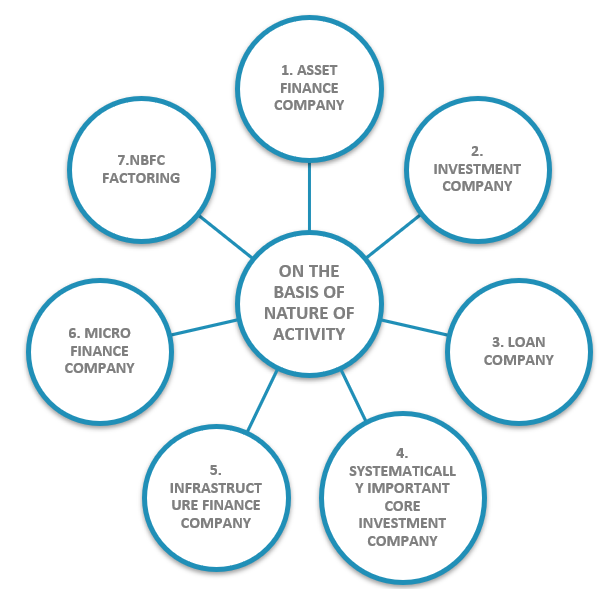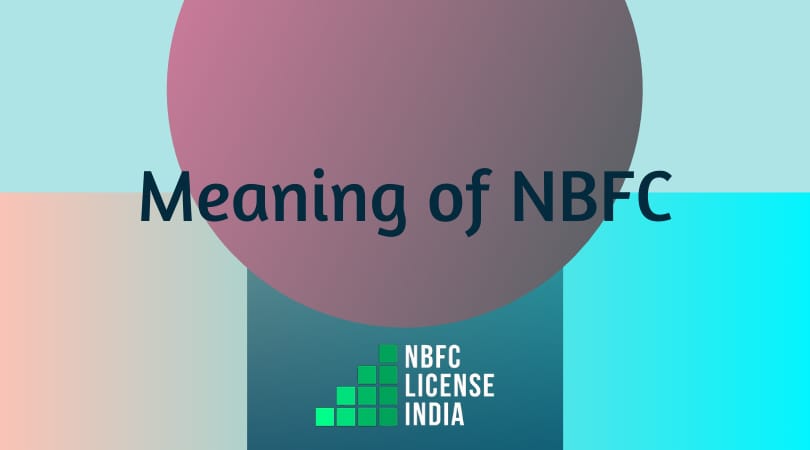Contents
Section 45I of the Reserve Bank of India Act, 1934 states NBFC meaning as –
- a Non-Banking Financial Institution which is a company,
- and which has as its principal business the lending in any manner, or receiving of deposits – under any scheme or arrangement, or in any other manner,
- such other Non-Banking Institutions or classes of such institutions, as the RBI may specify. With the previous approval of the Central Government and by notification in the Official Gazette.
This implies that a company can be considered for NBFC License if it is involved in any of the financial activities listed under clause (i) to (vi) of Section 45 I (c) of the Act.
Where the company is principally engaged in the business of non- financial nature such as real estate, agriculture, etc., it is known as a Non-Banking Non-Financial Company.
Principal Business – Criteria laid down by the RBI
Under Section 372A of the Companies Act, 1956, an investment company has been explained the same as a company whose principal business is the acquisition of shares/stock/debentures/other securities. Because Principal Business is not something that can be quantified in absolute terms about the figures stated in the financial statement of a company. Therefore, the term Principal Business, in NBFC meaning, can be called as the intention of the party to carry on a business activity as its primary activity. In case the business profile has changed over some time, the Principal Business may also change and then the company may not require to hold CoR granted by the RBI.
To identify a particular company as an NBFC in India, both the assets and the income pattern as documented in the last audited balance sheet of the company will be considered to decide its Principal Business. As per this provision, if the financial assets of a company are more than 50% of its total assets (netted off by intangible assets) and income from financial assets is more than 50% of the gross income, then the company will be an NBFC. The criteria of income/assets are cumulative, that is, both the conditions must be met together to know about the principal business of a company.
Though the fact remains that the primary activity carried on by the company gives it a character. And although the figures reported in the accounting books reflect the business activities of the company, still, it cannot be the sole measure to determine the nature of a company.
Courts also have given weight to the primary activity carried on by the company rather than its income and assets to determine its principal business.
NBFC NOF Meaning
RBI defines Net Owned Fund (NOF) as:
- The paid-up equity share capital and free reserves as per the latest balance sheet of the company is included, after deducting the following from it:
- Accumulated losses,
- Deferred Revenue Payments,
- Other intangible assets.
Further, below gets deducted from the resultant amount:
- Investment of such companies in the share of its subsidiaries, same group companies, and other NBFCs,
- the book value of debentures/bonds/outstanding loans and advances (including lease finance and hire purchase) made to, and deposits with its subsidiaries or companies within the same group more than 10% of the amount calculated in (1) above.
Types of NBFC
NBFCs can be broadly classified under either of these 2 categories:
- The Deposit Accepting NBFC (Type -1)
- Non-Deposit accepting NBFC (Type -2)
Type-1: Deposit Accepting NBFC Meaning
Deposit Accepting NBFCs must get themselves registered with RBI as per the provisions in the RBI Act, 1934. They need a Certificate of Registration (CoR) from the RBI. And there are additional guidelines and specific regulations prescribed by RBI for them.
Type-2: Non-Deposit Accepting NBFC Meaning
Non-Deposit Accepting NBFCs also need to get registered themselves. The only difference is additional guidelines do not apply to them.
Within the above broad categorization, the NBFCs can, further, be divided into:
- Asset Finance Company (AFC): The financial institution (FI) with the primary business of financing physical assets.
- Investment Company (IC): An FI engaged in the acquisition of securities, as its principal business.
- Loan Company (LC): An FI providing finance, as its principal business. The business activity is to make loans or advances or otherwise for any venture other than its own but does not include an Asset Finance Company.
- Infrastructure Finance Company (IFC): An NBFC-IFC meaning is the company which:
- extends at least 75% of its total assets in infrastructure loans,
- has minimum Rs. 300 crores as NOF (Net Owned Funds),
- has a credit rating of not less than “A”, and,
- a CRAR of 15%.

- Systemically Important Core Investment Company (CIC-ND-SI): The FI engaged in the business of acquisition of shares and securities. Below conditions must be followed:
- it holds not less than 90% of its Total Assets as investment in equity or preference shares, and debt or loans in group companies.
- its investments in the equity shares (including instruments that would convert into equity shares within a period not more than 10 years from the date of issue, compulsorily) in group companies forms at least 60% of its Total Assets.
- it does not invest in shares, debt or loans in group companies except through block sale for dilution or disinvestment.
- no financial activities, as listed under Section 45I(c) and 45I(f) of the NBFC Act in RBI, are carried out by it. its asset size is Rs 100 crore or more, and,
- it accepts public funds.
- Infrastructure Debt Fund (IDF): The primary business is to facilitate the flow of long term debt into infrastructure projects. They raise resources through issue of Rupee or Dollar denominated bonds having a minimum maturity period of 5-years. Only IFC – NBFC can sponsor IDF-NBFCs.
- Micro Finance Institution (MFI): NBFC-MFI meaning a non-deposit taking NBFC with at least 85% of its qualifying assets that satisfy the following criteria:
- loan disbursed to a borrower having a Rural Household Annual Income not exceeding Rs. 60,000, or Urban and Semi-Urban Household Income of not over Rs. 1,20,000.
- the loan amount should be less than Rs. 35,000 in the first cycle and Rs. 50,000 in subsequent cycles
- total indebtedness of the borrower is less than Rs. 50,000,
- loan duration of 24 months or over, if the amount is more than Rs. 15,000 with prepayment without penalty,
- loan to be extended without collateral,
- the aggregate loan amount, given for income generation, is at least 75% of the total loans given by the MFI,
- the loan is repayable as per frequency selected by the borrower, on weekly, fortnightly or monthly instalments.
This blog has been written under an awareness program by NBFC License India. To spread awareness of the nuances of the laws concerning NBFC and their meaning.
NBFC License India is a leading online platform for NBFC Registration. You can contact us if you wish to buy NBFC or sell NBFC. We also aid in mergers, take-overs, and collaborations.
For more information on the subject, you can call us at (+91) 8750008585.
Related Posts:
NBFC Regulation: A Complete Guide For You
Frequently Asked Questions
Q. What is NBFC?
NBFC is a company registered under the Companies Act 1956 or 2013. NBFC is a company with its primary business of receiving deposits. It raises funds from the public (Directly or indirectly) and lends them to the small enterprises. NBFCs provide credit facilities and are preferred more than banks. They are not allowed to run their business without getting a license from RBI.
NBFCs are an important source of financing for the Indian small scale industries.
Q. What is the process of NBFC registration?
- The applicant company is required to apply for online for NBFC registration to the RBI. On successful submission of the application form and relevant documents, a CARN number is generated. This number is to be used for reference during all future conversations and enquiries.
- After that, the company is to submit the hard copies of the online application, and the supporting documents uploaded, to the nearest regional office of the RBI.
- After verifying the documents, the regional office forwards the application to the head office of the RBI. There, a more thorough examination is conducted.
- If all legal conditions are being met, the company will be registered as an NBFC. And the NBFC license will be issued.
Q. What documents are required for NBFC registration?
The documents to be attached with the application form for NBFC registration are:
-
- Company’s Incorporation Certificate
- Company’s Bank Account with a minimum paid-up equity share capital of Rs. 2 crore
- MoA & AoA
- Address proof of the company
- Duly filled up and signed Annexure I, II, and III
- Details about the Directors
- Documents of administration and management of the company
- Audited financial accounts for last 3-years
- Board resolution approving the company’s registration as an NBFC
- A brief overview of the company’s works and activities in the past 3 years
- Income tax, PAN, etc.
- Any other relevant documents.
Q. Does RBI regulate all financial institutions?
No, RBI does not regulate all financial institutions. Housing Finance Companies, Merchant Banking Companies, Stock Exchanges, Companies engaged in the business of stock-broking/sub-broking, Venture Capital Fund Companies, Insurance companies, Nidhi Companies, and Chit Fund Companies are NBFCs but they are exempt from registration u/s 45-IA of the RBI Act, 1934.
Q. What is the difference between NBFCs & banks?
NBFCs provide finances, loans, and make investments. In this regard, you can say that their activities are the same as banks. However, there are a few differences between the two entities:
- NBFCs cannot accept deposits repayable on demand,
- They do not form part of the payment and settlement system.
- They cannot issue cheques drawn on itself,
- The deposit insurance facility by Deposit Insurance and Credit Guarantee Corporation is not accessible to investors of NBFCs.

